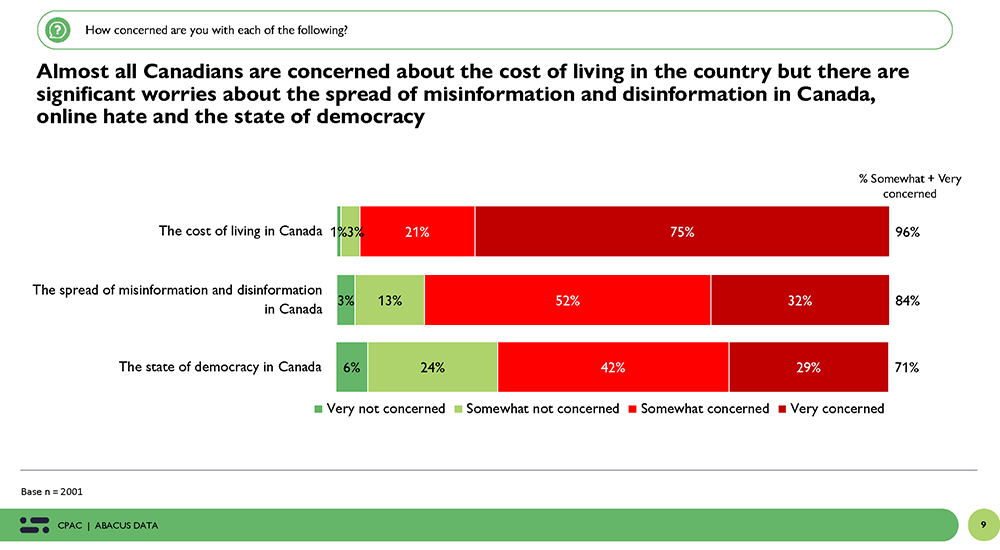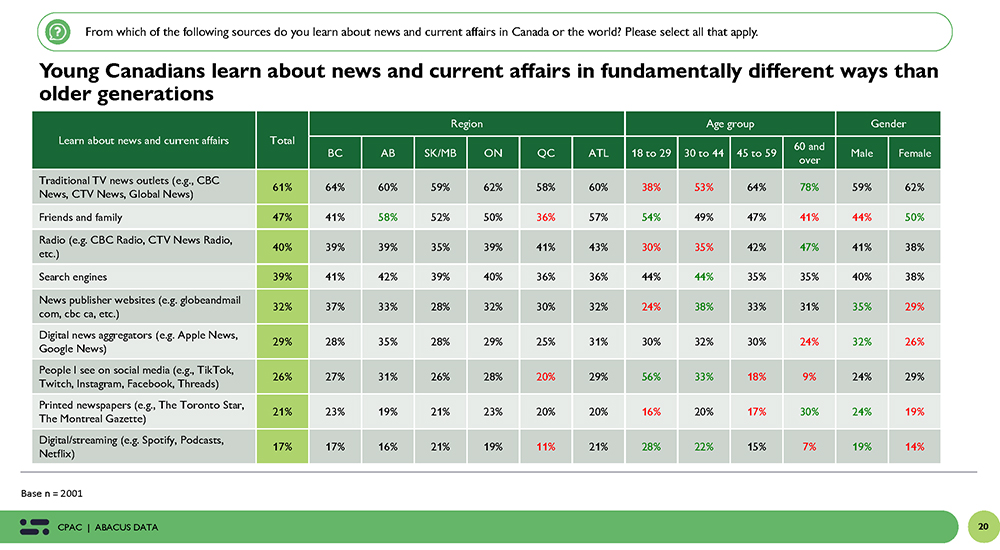By Janet E Silver | PUBLISHED June 3, 2024 6:00amET
As security officials, including CSIS in its annual report (opens in a new window) released on May 7, warn that disinformation is one of the biggest threats to Canada, more than three-quarters of Canadians share those concerns, according to an Abacus Data poll commissioned by CPAC in April.
Eighty-four percent of those surveyed said they were at least somewhat concerned about the spread of misinformation and disinformation and this anxiety may be impacting our democracy.
“I'd say 84 per cent is a really high number (and) this crosses the political spectrum…. The only other one that we tested in this survey, and I've seen in other surveys that more people agree is a problem, is the cost of living,” said David Coletto, Founder, Chair and CEO of Abacus Data.
“There's widespread concern about the state of our democracy. And there's broad recognition that the world we live in, how we get information, who creates that information and shares it, is distorting our sense of reality, our ability to solve problems collectively and ultimately might be influencing at some level the kind of democracy we end up having,” David Coletto said.
In fact, the survey found that more than seven in ten Canadians are very or somewhat concerned with the state of democracy in the country, which is driven in part by current political frustrations.
As those concerns grow, fewer people get their news and information from traditional news outlets or trust the information they receive. Eighty per cent of respondents' question if the information they have read or heard is true though 74 per cent are confident of their ability to discern truth from falsehood. Younger Canadians, those 18 to 29, get their news from social media (56 per cent), or from family and friends (54 per cent) compared to 61 per cent, most of whom are 60 years or older, who get their news from traditional news outlets.
More than seven in ten Canadians are very or somewhat concerned with the state of democracy.
“We have seen for a while now trust in most institutions deteriorating, that Canadians of all ages, of all political persuasions are just less likely to trust government, news, media, journalists, any authoritative source of either information or power,” Coletto said.
“Long gone are the days where news anchors, for example, had authority that everybody would tune in to and say, okay, that's what's happening. We can at least agree on what's happening, why it's happening, and then let's debate how we solve it or what the best course of action is. Increasingly, because of this fragmented ecosystem, we don't even agree on what the problem is anymore. And I think that explains the polarization we see in our politics.”
In addition, the survey showed that only one in three Canadians say they frequently fact check information they see online, even though a majority believe they're being exposed to a lot of incorrect information. Most respondents said that social media was the main culprit for spreading misinformation and disinformation.
Long gone are the days where news anchors, for example, had authority that everybody would tune in to and say, okay, that's what's happening.
“When we're feeling anxious, when we're feeling frustrated, when we're feeling hopeless in many ways we're more easily persuaded, perhaps, to believe something that may not be true…. How we get information has never been so fragmented, and we're just really, really grumpy and anxious. And you mix that all together and it creates the cocktail for rage, for populist politics that we've seen around the world. And we're seeing, I think, emerge in Canada as well.
The Abacus Data survey of 2001 Canadian residents aged 18 and over was conducted between April 11 to 14, 2024. The margin of error for a probability sample of this size is plus or minus 2.19 per cent, 19 out of 20.
CPAC will air an exclusive special Detecting Disinformation for Democracy, Thursday June 27th at 7pm ET. See it on CPAC.
This project has been made possible in part by the Government of Canada.






